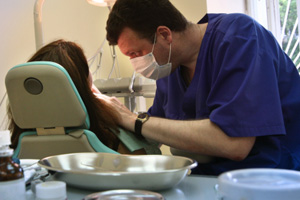GROWTH in the number of office-based procedures, particularly in cosmetic surgery, highlights the urgent need to look at the lack of regulation in this area, according to an editorial in the latest MJA. (1)
Dr Hugh Bartholomeusz, a plastic surgeon and councillor of the Australian Society of Plastic Surgeons, wrote that given the increasing complexity of surgery undertaken in office-based facilities, the lack of regulation posed an unacceptable risk to patient safety.
Patients were largely unaware that different safety and quality standards and controls applied to surgical procedures performed at hospitals and day surgeries compared with doctors’ offices, Dr Bartholomeusz wrote.
“Nationally consistent requirements for office-based facilities should be implemented”, he said.
Dr Batholomeusz told MJA InSight that although regulatory bodies were looking into the need for regulation of office-based procedures it was taking far too long to introduce standards.
He said the Society of Plastic Surgeons had made a submission to the Australian Commission on Safety and Quality in Health Care to expedite the regulation process.
In its submission to the commission, the society recommended that a modified version of the American Association for Accreditation of Ambulatory Surgery Facilities International class A standards be used as a template for accreditation of office-based surgical facilities in Australia. (2)
“The commission has looked at standards for dental procedures, which are largely done in rooms, so why have they ignored office-based medical procedures?”
Dr Bartholomeusz said the society was aware of office-based procedures being undertaken with anaesthesia where patients were unconscious, which presented serious risks.
He was also concerned that many patients did not know if a doctor who called themselves a surgeon did have the correct qualifications. Many patients also assumed regulations were in place for procedures.
“Someone needs to treat this seriously”, Dr Bartholomeusz said. He hoped the Council of Australian Governments would address the need for national regulations.
The US standards include the use of local and/or topical anaesthesia only, and specify sterilisation methods, and maintenance and cleaning procedures.
Professor Bruce Barraclough, the dean of education with the Royal Australasian College of Surgeons, said the MJA editorial raised reasonable questions on the accreditation of office-based surgery.
Professor Barraclough said increased demand for cosmetic surgery had resulted in an increase in office-based procedures.
He said the use of office-based surgery was far more extensive in the US than in Australia, where the same procedures were more likely to be done in day surgeries.
The College of Surgeons had a code of practice to ensure patients were not put at risk, and members were also accredited by hospitals and day surgeries to perform procedures, Professor Barraclough said.
However, most doctors performing office-based procedures were not surgeons or members of the college.
“Office-based procedures are generally safe and cost-effective”, he said.
“Patients trust the system in Australia and trust the people who they ask to do surgical procedures, and in most cases they are right to be trusting.”
Professor Barraclough said a move towards accreditation of office-based procedures was inevitable.
MJA InSight did seek comment from the Australian Commission on Safety and Quality in Health Care, but it did not respond.
– Kath Ryan
1. MJA 2012; 196: 492-493
2. ASF International: International Accreditation Standards & Checklist
Posted 7 May 2012

 more_vert
more_vert
I do not believe that another office in the halls of medical regulatory bureaucracy will serve any useful purpose here other than to give some (many I suppose) people a pay cheque.
In WA we have had, for about 6 yrs, the requirement to be a registered hospital (Class B – Twilight sedation) for all procedures using ANY medication for sedation. This should be adopted throughout the country. The Australian and New Zealand College of Anaesthesia has existing relevant standards for doing twilight sedation. The vast majority of cosmetic surgery done in day hospitals in the USA are done in similar office based day hospitals.
Surprisingly even here in WA dentists and radiology practices are exempt from the requirement to meet the Class B Day Hospital standards. I was told the dental association told the Dept of Health they would ‘self regulate’.
I believe Dr Hugh Bartholomeusz’ demand for more bureaucracy regarding office procedures would be taken more seriously if he could back up his claims with evidence that patients are actually coming to harm from the status quo.
Because if they are not, increased bureaucracy would invariably lead to increased cost and potentially worse outcome
If this gets off the ground, all that will happen is that GPs will abandon office-based procedures, putting more strain and expense on the public purse. People will start going to EDs and public hospital daystay units for minor skin lesions, ingrown toenails and simple fractures. The same has already happened in obstetrics, oncology and a number of other areas that GPs once handled well.